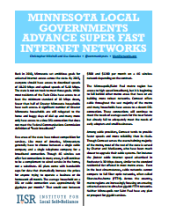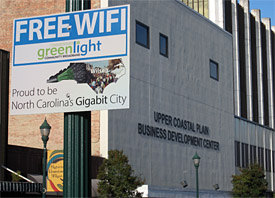
Fast, affordable Internet access for all.


Community leaders in Lexington are the latest to stand at a fork in the broadband road. In September, the franchise agreement between the Lexington-Fayette Urban County Government (LFUCG) and Time Warner Cable expired, resulting in a month-to-month agreement continuation. As they negotiate a new contract, local citizens have called for consideration of a municipal network.
When the contract was originally negotiated in the 1990s, the community was primarily interested in cable TV servce. As broadband has become critical infrastructure for residents, businesses, and government, the community's focus shifted. Lexington customers have complained repeatedly about Internet and cable TV service from Time Warner Cable. A February Kentucky.com article noted that local consumers complained over 300 times to Lexington's Urban County Government, the entity responsible for contract negotiations. According to the article:
The biggest single category of complaints was about price and the volatility of monthly rates. Other complaints were that the cable TV service "repeatedly fails, resets or freezes"; that there was an extended wait time and/or "unhelpful responses" in customer service; and that email and Internet "had declined in service" and showed "significantly slower service."
The City Council considered the situation bad enough to debate whether or not to appoint an ombudsman to advocate for Lexington consumers.
The community wonders how the proposed merger between Time Warner Cable and Comcast will impact their current service. While the Vice Mayor seems to think it is an "almost golden opportunity" to deal with a different provider, local citizen Roy M. Cornett has a different perspective. He wrote for Business Lexington.com:
The Government Accountability Office released a report today examining economic development and government-spurred broadband deployment. The report, titled Telecommunications: Federal Broadband Deployment Programs and Small Business looks at the effects of stimulus projects on opportunities for small business.
According to the press release:
“GAO’s investigation confirms the success of the Recovery Act’s broadband programs," said Rep. Waxman. “In rural and urban areas across the country, small businesses are benefitting from higher speeds and lower prices thanks to federal investment in this essential infrastructure. Expanding broadband access and quality is critical for American competiveness in the 21st century global economy. These were public dollars well spent.”
The report reviews communities around the country where either federal dollars have been invested in networks or local governments have made such investments. The results were consistent with our findings over the years - municipal networks create a business-friendly environment and contribute to economic development.
According to the report summary:
According to small businesses GAO met with, the speed and reliability of their broadband service improved after they began using federally funded or municipal networks.
Regarding competition, the GAO find that municipal networks spur competitor investments:
For example, following the construction of a fiber-to-the-home municipal network in Monticello, Minnesota, the two other broadband providers in the area made investments in their infrastructure to improve their broadband speeds. One of these providers stated that all of its networks undergo periodic upgrades to improve service, but upgrade schedules can change in order to stay competitive when there is a new service provider in a particular market.
Westminster's FTTP pilot project continues to blossom. We recently heard from Dr. Robert Wack, one of the local leaders of the project.
Engineering, the first phase, is almost completed with bids for construction soon to be solicited.
Even before any fiber is in the ground, Westminster is feeling the positive economic development effects from the network. According to Dr. Wack, Carlisle Etcetera, a women's fashion clothing company, will be relocating from New York City to Westminster. Carlisle will bring its distribution and data centers because it will have access to the next generation fiber network.
The local Industrial Development Authority is an official supporter of the project and will contribute local funds for capital costs.
 And it has, even for young entrepreneurs elsewhere in the state. For a tech entrepreneur like Dan Holt from Wake Forest, renting space at this Wilson-based incubator lets him be part of the future, and to experience the possible which is impossible at his home in Wake Forest only 30 miles away. Dan is a self-described techie for a local Raleigh defense subcontractor but he likes to be known as founder of the Wake Forest Fiber Optic Initiative.
And it has, even for young entrepreneurs elsewhere in the state. For a tech entrepreneur like Dan Holt from Wake Forest, renting space at this Wilson-based incubator lets him be part of the future, and to experience the possible which is impossible at his home in Wake Forest only 30 miles away. Dan is a self-described techie for a local Raleigh defense subcontractor but he likes to be known as founder of the Wake Forest Fiber Optic Initiative.In 1985, Auburn Electric became one of the first communities in the midwest to deploy fiber. At the time, the purpose was to improve electric and voice systems substation communications within the municipal utility. That investment laid the foundation for a municipal network that now encourages economic development and saves public dollars while enhancing services.
Auburn expanded its fiber network beyond electric systems in 1998. The utility began using the network to serve city and county government operations. It is not well known, but Auburn offered gigabit service to its public sector customers way back in 1998.
The benefits from the deployment prompted community leaders to develop an Information Technology Master Plan in 1998 that would answer the question of what other ways the fiber could serve the community? As part of the Master Plan, Auburn leaders collected information from other communities that were capitalizing on their own local fiber. While Auburn made no immediate plans, they kept an open mind, waiting until the time was right.
In 2004, Cooper Tire and Rubber (now Cooper Standard) was about to be sold from its parent company. The $1.6 billion auto component manufacturer needed a data center but bandwidth was insufficient and inconsistent in Auburn. Cooper considered leaving because the incumbents, Mediacom and AT&T, could not or would not provide the broadband capacity the company needed. If Cooper left town, an estimated $7 million in wages and benefits from 75 high-paying tech jobs would also leave. At the time, Auburn was home to 12,500 people.

According to Schweitzer, the City tried to persuade the telephone company to find a solution with Cooper but the two could not reach an agreement. Rather than lose Cooper, the City of Auburn stepped in to fill the connectivity gap in 2005.
In a 2007 interview with Public Power magazine, Schweitzer noted advantages in Auburn that facilitated the project:
A year has passed since we covered SpringNet in Springfield, Missouri, and its remarkable impact on local businesses and economic development. We recently spoke with SpringNet Director, Todd Murren, and Network Architecture Manager, Todd Christell, to get an update on how the network is progressing.
Demand for SpringNet’s high-speed data services continues to grow steadily. Financial statements for City Utilities of Springfield show the network generated $16.4-million in operating revenue last year against costs of $13.2-million. Better yet, revenues have increased around 3% per year while cost increases are closer to 0.5%. The end result is close to $3 million in annual net income for SpringNet. And all of this comes from a network that only serves commercial and public sector clients because Missouri state law restricts municipal network provision to only “Internet service,” meaning SpringNet cannot offer triple-play packages to compete with incumbent providers.
One of the highlights of SpringNet’s economic development success has been the attraction and retention of travel giant Expedia. After a large national provider failed to deliver on negotiations with the company, SpringNet stepped in to make sure Expedia brought its call center to Springfield. That effort has paid off handsomely for SpringNet and the local community. Expedia now employs close to 900 in the area after announcing in July that it was hiring another 100 employees in Springfield.
Up next for SpringNet is an effort to leverage its fiber infrastructure to create even more jobs. Believing that future job growth will revolve around the advancements enabled by gigabit networks, SpringNet is working with the Mid-America Technology Alliance (MATA) to host a hackathon with partners in Kansas City to explore what is possible between gigabit cities.
Danville's open access network has fueled economic development in the Virginia community's resurgence after tobacco’s demise and job losses from a once thriving textile industry put a hurt on the local economy. Danville’s technological prowess is now attracting companies from China, in addition to other economic development gains we covered previously.
Jason Grey, nDanville’s Network Manager, told us that Zeyuan Flooring International, a Chinese wood floor manufacturer, is locating its first U.S. facility in Danville. Zeyuan CEO, Sindy Cui, said the company initially thought about locating in Los Angeles, but was eventually swayed by the hospitality and resources available in Danville. Zeyuan plans to invest $15-million in a 40,000 square foot manufacturing plant that will employ 100 people within three years.
Zeyuan is the second Chinese company to locate in Danville in the past year. Last September, Chinese furniture assembler GOK International announced it will invest $12.5-million to establish its U.S. headquarters and showroom in Danville. GOK International plans to employ 300 people within three years.
Not coincidentally, both companies are locating in Cane Creek Centre, one of Danville’s five industrial parks connected to nDanville’s fiber network. Serving businesses was a high priority in building the network. As the first fully automated open-access network in the country, nDanville passes more than 1,000 businesses including every parcel in each of the industrial parks. Many businesses take 100-Mbps fiber connections, some take advantage of 1-Gbps connections.
These recent additions to Danville’s thriving commercial sector are just the latest in a steady string of economic development successes for the area that include the likes of Goodyear and IKEA. And it’s not just manufacturing.